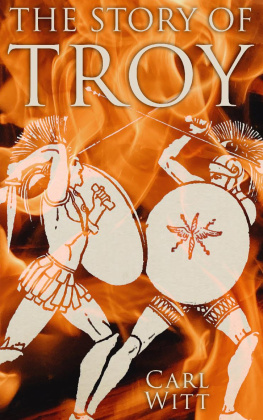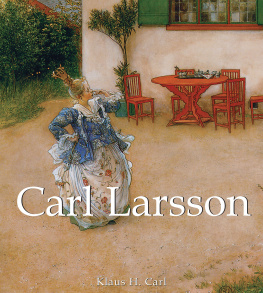CHAPTER I.
PARIS AND HELEN.
There was once a sea god named Nereus, who lived with his fifty daughters in a beautiful shining grotto at the bottom of the sea. The daughters were called Nereids, and they spent most of their time in spinning with golden spindles ; but if a ship was in danger of sinking through storms or rough weather, they were always ready to go to the help of the distressed sailors, for they were kind and friendly to men. They were all marvellously beautiful, but especially one of them whose name was Thetis, and who was beloved even by the gods who dwelt on Mount Olympus. Now there was a young prince in Thessaly, named Peleus, who was also dear to the gods, and to him they gave the beautiful Thetis for a wifea goddess to a mortal man.
The marriage was celebrated on Mount Pelion, and all the gods and goddesses were invited to it excepting one, the goddess of Discord, whose name was Eris. She was very angry at not being asked, and determined to have her revenge. So when the wedding-feast was at its height, she suddenly appeared with a golden apple in her hand, and threw it among the guests, crying out, 'For the fairest.' Then there arose a strife among the three goddesses, Hera, Athene, and Aphrodite, as to which of them could claim the apple. And fair indeed they all three werefairer far than any mortal woman. Hera the wife of Zeus, the king of the gods, looked like the most glorious queen that could possibly be imagined, filling the beholder with awe and reverence ; Athene had the beauty of a hero maiden, and her eyes sparkled with courage and wisdom ; Aphrodite was full of charm and grace, and no one who saw her could ever tire of gazing at her bewitching loveliness. As neither of them would give up her claim to the apple, it was settled that they should choose a mortal to decide between them. Eris had already gained her purpose, for when the strife began, all the happiness of the wedding-feast was at an end, and the guests quickly dispersed.
Now there lived in Asia a young prince named Paris, who had the care of his father's flocks, and tended them on the slopes of Mount Ida, not far from the city of Troy. He it was whom the goddesses chose to decide which of them was the fairest; and one day when he was sitting under the shade of a tree in a wooded vale of Mount Ida, playing on a reed-pipe, the three suddenly stood before him in their dazzling beauty. He was at first quite bewildered at the sight, but they told him for what purpose they had come, and gave him the golden apple, which he was to hand to her whom he considered to be the fairest.
Then Hera first stood forward, and said, 'If you give the apple to me, I will make you a mighty king, ruling over many lands.' After this, Athene spoke, and she said, 'If you award the apple to me, I will gift you with such wisdom that men shall extol you as a god, and shall come from far distant lands to ask your counsel.' Lastly, it was the turn of Aphrodite, and she said, 'My reward, if you decide in my favour, will be that you shall have the most beautiful woman in the world for your wife.' Each gift, as the goddesses offered it, appeared to the young prince to be better than the last. When they had done speaking he paused for a moment; but it still seemed to him that the promise of having the most beautiful woman in the world for his wife was the best, and he held out the apple to Aphrodite. She was overjoyed at her victory, but the other two goddesses were filled with bitter hatred against the young prince and his whole race.
Some time after this, there began to be much talk everywhere of the beauty of Helen, daughter of the King of Sparta, who was said to be the loveliest maiden in the world. Her real father was Zeus, but Tyndareus, the King of Sparta, with whom she lived, was her step-father ; and she had two brothers named Castor and Pollux, one of whom was the son of Zeus and the other the son of Tyndareus. The fame of her beauty spread far and wide throughout Greece, and there was hardly a young prince who did not desire to win her for his wife. Soon there was a great assemblage of noble suitors at the court of Tyndareus, and the king had to choose between them. This made him very uneasy, for as he could only make one of them happy by his decision, he feared that those who were disappointed would take up arms against the husband of Helen and destroy the peace of her home; and he could not think of any means of escaping from this difficulty. It happened, however, that among the suitors was Ulysses, the wise young King of Ithaca. He had come to Sparta like the rest, in the hope of obtaining Helen for his wife, but since his arrival he had seen a maiden who pleased him even betterPenelope, the daughter of Icarius, who was one of the chief men of Sparta. Ulysses guessed rightly what it was that made Tyndareus move about among his guests with a face so full of care, and he said to him that if he would induce Icarius to promise him his daughter Penelope, he would give the king in return some good advice that would help him out of his difficulty. Tyndareus willingly agreed, and Ulysses gave him the advice he had promised. It was this,that before announcing which of the suitors he had chosen to be the husband of Helen, he should make them all swear solemnly to stand by him if ever he should come into any trouble on her account. Tyndareus followed this wise advice, and none of the suitors ventured to decline the oath, because each of them thought, 'Perhaps I may be the chosen husband, and then I shall have all the others to help me.' After they had all sworn, Tyndareus made known his decision, and said that he had chosen the brave young hero Menelas to be his son-in-law and the heir to his kingdom. Soon after this Tyndareus died, and Menelas succeeded him as king of Sparta.
Menelas had thus the most beautiful wife in all Greece, and he and Helen lived happily together for some years. But by-and-by Aphrodite thought it was time that she should fulfil the promise which she had long ago made to Paris in the vale of Mount Ida, and she went to him and said, 'Get ready a ship and set out for Greece. There, in the house of Menelas, the King of Sparta, you will find the most beautiful woman in the world, and I will cause her to forsake her husband and return with you to Troy.' Paris begged his father, King Priam, to lend him a ship, for he wanted, he said, to travel to Greece and establish friendly intercourse with the nobles and princes of that country ; and Priam gave him what he wanted. When he arrived in Sparta he was kindly received by the king ; for though the eyes of the young man were full of love, how should Menelas suspect that he had come to rob him of his wife?
Helen was soon affected by the magic spell which Aphrodite cast over her, and when she sat at the feast with her husband and Paris, she could not turn her eyes away from the stranger. Every day he pleased her better, though if it had not been for the magic of Aphrodite she would never have preferred him to her husband ; for Paris was beautiful indeed, but with the beauty of a dancer, whereas Menelas had the beauty of a hero. Many a secret talk they had together, and at last the queen consented to forsake her husband and child, and to go away with Paris to a strange land, taking all her treasures with her. They prepared everything for their flight, and one day when Menelas came home from hunting, he saw far out at sea the ship in which Helen had sailed away with the robber.
Menelas was beside himself with grief and distress; but he had a brother, Agamemnon, the powerful King of Mycenae, who when he heard of his trouble, came to Sparta to try and comfort him. He told him that he would soon be able to recover his wife with the help of the princes who had formerly sued for Helen, for they were still bound by their oath, and it would be their duty to restore her to the husband from whom she had been stolen away.












